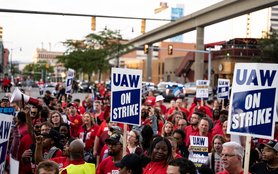A public ceremonial revival vs. a public revitalization of communities and connecting to purpose
Waikinya J.S. Clanton is the Mississippi Director of the Southern Poverty Law Center
Throughout history, we have faced times of uncertainty where our freedoms were unmercifully challenged. This year, as we once again commemorate Juneteenth, I find myself pondering what freedom does feel like vs. what it should feel like for Black people-158 years later.
The Black experience is an ode to our collective strength, not only to our collective pain. It is a celebration of perseverance, innovation, and our enduring spirit. Juneteenth isn't a chance for public revival. It is our opportunity to revitalize our communities by restoring what was lost and reconnecting to our purpose.
You can't effectively know where you're going until you know where you've been. Juneteenth isn't just a day of Jubilee and reflection; it is also a day of charge and commitment.
The origins of Juneteenth
Originally introduced in San Francisco, California in 1945, by Texas migrant Wesley Johnson, Juneteenth is now a federal holiday that celebrates the freeing of the last enslaved people in Galveston, Texas, in 1865--approximately two years after the signing of the Emancipation Proclamation by President Abraham Lincoln.
The Emancipation Proclamation declared that as of January 1, 1863, "all persons held as slaves" within the rebellious states "are, and henceforward shall be free."
To be a slave is to be deprived of your most common human rights; it is to be treated as property-chattel, chained, branded, and restricted in such a way that it strips away your humanity and rids you of your dignity.
It is to be separated from all you know. It is the encampment and entrapment of both your body and your mind.
To be enslaved is to live in a constantly repressed and repressive state. It is to be held in bondage and through acts of subjugation, never knowing or truly realizing freedom.
I am reminded of an excerpt from Frederick Douglass' 1852 speech, "What to the Slave is the Fourth of July?" where he answered the question in saying, "A Day that reveals to him [the slave], more than all other days in the year, the gross injustice and cruelty to which he is the constant victim."
To him, I say, Mr. Douglass, we are not victims; we are the proud descendants of our ancestors.
Giving Juneteenth purpose today
How do we give Juneteenth a purpose beyond the recognition of ceremonies, traumatization, and the harsh realization of the many ills and obstacles that Black people endure and overcome daily--from pay inequality to police brutality?
How do we demand equity, opportunity, and freedom for the people right here at home?
How do we regain control of our communities-centering those things that make them beautiful, filling them with joy, and restoring them as places of safe haven and refuge?
Through activism, advocacy, and accountability, the answer is simple: we do it together, and we do it with a commitment of unity.
Because together, we are unstoppable.
Today is the day we take an active interest in our neighborhoods, how they look, how they feel, how they represent us, and what they say about us.
Most importantly, what they reflect about what we believe about us.
Juneteenth is the day that we rise up and own the greatest parts of our heritage and acknowledge the darkest. We determine who we are, what we stand for, and who we shall become. We are more than an address and we are more than our jobs. We are a collective body that is committed to reinstating unity in our community.
This a moment of recall; it is a day of resurgence, recommission, repositioning, and a day to reset our intentions and reclaim our futures.
This is our opportunity to realign and reimagine a life that is free of mental, physical and spiritual bondage.
Juneteenth calls on us to free ourselves, it calls on us to concentrate ourselves on intentions for a better tomorrow, and an even better day for future generations.
President Obama once said that "Juneteenth has never been a celebration of victory, or an acceptance of the way things are. It's a celebration of progress. It's an affirmation that despite the most painful parts of our history, change is possible..."
I challenge you to be that change. I challenge you to imagine a place where Black women can safely and humanely deliver their children. I challenge you to imagine what would happen if barriers to housing were not created. I challenge you to believe in the ability for everyone to have a secure place to receive their education.
I challenge you to be the change we need in order to revitalize and enhance our communities and reconnect to the purpose of what bonds us to together, the freedom to be.



